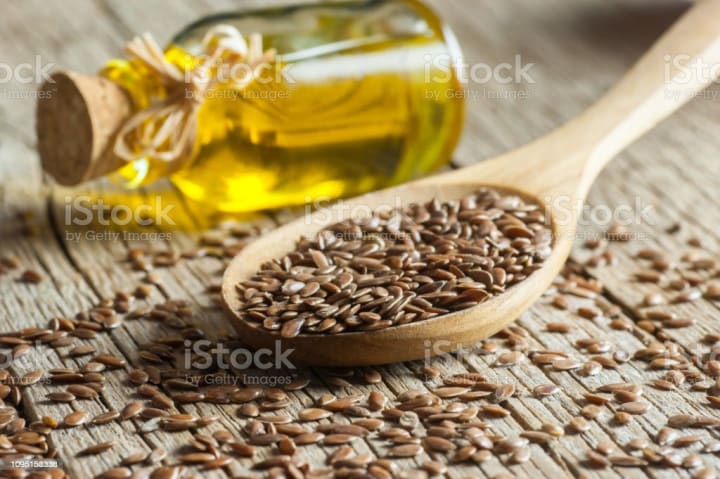"The Nutritional Powerhouse: Unveiling the Health Benefits and Versatility of Flaxseed"
Introduction

"The Nutritional Powerhouse: Unveiling the Health Benefits and Versatility of Flaxseed"
Introduction
Flaxseeds include good amounts of protein, fiber, and omega-3 fatty acids. Flaxseed is one of the oldest crops in the world. There are two types, brown and golden, and both have the same nutritional value. It may help reduce the risk of some cancers, maintain a healthy weight, and lower cholesterol and blood pressure. With its mild, nutty flavor and crunchy texture, flaxseed is a versatile ingredient that can enhance the flavor and texture of almost any recipe. One such use is to mix it into your morning smoothie, great for pancake batter, homemade veggie burgers, and even overnight oats. In addition, it is rich in nutrients and has various effects. Here are some scientifically proven health benefits of flaxseed, along with some easy ways to increase your intake.

1. Nutrition
Just one serving presents a great quantity of protein, fiber, and omega-3 fatty acids, along with numerous crucial vitamins and minerals. One tablespoon (7 grams) of ground flaxseed carries:
• Calories: 37
• Carbs: 2 grams
• Fat: 3 grams
• Fiber: 2 grams
• Protein: 1.3 grams
• Thiamine: 10% of the everyday value (DV)
• Copper: 9% of the DV
• Manganese: 8% of the DV
• Magnesium: 7% of the DV
• Phosphorus: 4% of the DV
• Selenium: 3% of the DV
• Zinc: 3% of the DV
• Diet B6: 2% of the DV
• Iron: 2% of the DV
• Folate: 2% of the DV
Flaxseed is particularly high in thiamine, a B vitamin that plays a key role in energy metabolism in addition to cell characteristics. It's additionally an extraordinary source of copper, which is concerned with brain development, immune fitness, and iron metabolism.
2. High in omega-3 fatty acids
Flaxseed is an excellent source of alpha-linolenic acid (ALA), a type of omega-3 fatty acid that's essential for heart fitness and is found mostly in plant foods. LA is one of the two critical fatty acids that you have to acquire from the meals you eat, considering the fact that your body doesn't produce them. Animal research advises that the ALA in flaxseed may assist in reducing irritation and preventing LDL cholesterol from being deposited in your heart's blood vessels. A recent study of 8,866 people found that increased ALA intake was associated with lower cholesterol and a lower risk of ischemic heart disease and type 2 diabetes, which are associated with the narrowing of the arteries. A number of studies have also found an association between ALA and a reduced risk of stroke. Additionally, a comprehensive review of 34 studies found that increased ALA intake was associated with a lower risk of death from heart disease.
3. May additionally assist in preventing cancer.
Flaxseed is rich in lignans, plant compounds that have been studied for their robust anti-cancer properties. Interestingly, the seeds contain 75–800 times more lignans than other plant foods. Some studies have linked flaxseed consumption to a lower risk of breast cancer, especially in postmenopausal women. Animal and test-tube studies have also shown that flaxseed protects against colon, skin, blood, and lung cancer. Note that further studies in humans are needed.
4. Rich in dietary fiber
Just one tablespoon (7 grams) of flaxseed powder contains 2 grams of fiber, which is about 5% and 8% of the recommended daily intake for men and women, respectively. In addition, flaxseed contains both soluble and insoluble fibers, which are fermented by intestinal bacteria to support intestinal health and improve bowel movements. Soluble fiber absorbs water in the intestines, slows digestion, helps regulate blood sugar levels, and lowers cholesterol, while insoluble fiber increases stool bulk, prevents constipation, and promotes regular bowel movements.
5. May lower cholesterol levels
Flaxseed also helps lower cholesterol levels. A month-long study of people with peripheral arterial disease found that eating four tablespoons (30 grams) of flaxseed powder per day reduced LDL (bad) cholesterol levels by 15%. A 12-week study of 112 people with high blood pressure found similar results, with four tablespoons (30 grams) of flaxseed per day leading to significant reductions in body mass index (BMI), total cholesterol, and blood pressure. These effects may be due to the fibers in flaxseed binding to bile salts before they are excreted from the body. To replenish these bile salts, cholesterol is drawn from the blood to the liver, resulting in lower levels.
6. May lower blood pressure.

Flaxseed is known to have antihypertensive effects. A review of 15 studies found that consuming flaxseed products, including flaxseed powder, can significantly lower both systolic and diastolic blood pressure (upper and lower limits, respectively). This seed may be especially effective for humans with high blood pressure. In fact, a small 12-week study showed that 4 tablespoons (30 grams) of flaxseed per day reduced blood pressure in people with high blood pressure. Additionally, a large review of 11 studies found that daily consumption of flaxseed for more than 3 months could lower blood pressure by 2 mmHg.
While this may not seem important, some studies suggest that a 2 mmHg drop reduces the risk of stroke and coronary artery disease by 14% and 6%, respectively.
7. Can stabilize blood sugar levels
Flaxseed stabilizes blood sugar levels and promotes blood sugar control. A review of 25 studies found that whole flaxseed may lower blood sugar levels and prevent insulin resistance, a condition that affects the body's ability to regulate blood sugar levels effectively. This blood sugar-lowering effect may be due to the soluble fiber contained in this seed. Studies show that soluble fiber can slow the absorption of sugar in the blood and lower blood sugar levels. Therefore, flaxseed is especially helpful if one has type 2 diabetes. Note that the glycemic control benefits of flaxseed apply primarily to the whole flaxseed, not the flaxseed oil. This is because flaxseed oil does not contain dietary fiber.
8. Helps with weight management
Some studies suggest that flaxseed may help with weight management. An older study found that a drink containing flax fiber tablets with 2.5 grams of soluble fiber reduced hunger and overall appetite. This is probably because soluble fiber slows down digestion and increases satiety, which is especially helpful when dieting. In fact, a comprehensive review of 45 studies found that flaxseed supplementation significantly reduced body weight, BMI, and abdominal fat.
Both flaxseed and flaxseed oil are easy to use and can be added to a variety of recipes.
Here are a few smooth ways to boost your consumption.
• Add flaxseed powder to water or sprinkle it on smoothies.
• Use flaxseed oil on fresh salads instead of salad dressing.
• Sprinkle ground flaxseed on hot or cold cereals to add fiber and flavor.
• Mix flaxseed into your favorite yogurt.
• Add a healthy twist to your baked goods by mixing flaxseed into cookies, muffins, or bread.
• Mix flaxseed with a little water for an easy egg substitute.
• Mix flaxseed into meat or vegetable patties the next time you heat up the grill.

Tips for adding flaxseed to your diet
Here are some tips on how to add these tiny seeds to your daily diet: Consume crushed rather than whole seeds.
Ground flaxseed is much easier to digest than whole flaxseed. Part of the reason is that the gut is unable to break down the hard outer shell of the entire seed. However, you can also buy whole flaxseeds, grind them in a coffee grinder, and store the ground flaxseeds in an airtight container for easy use.
How can we explain linseed oil?
Flaxseed oil is typically produced through a process called cold pressing that helps extract the oil from the seed effectively. This oil is very sensitive to heat and light, so it is best stored in a dark glass bottle in a dark, cool place such as a cupboard. Flaxseed oil contains nutrients that are sensitive to heat, so it is not suitable for high-temperature cooking such as frying. However, some studies have shown that light frying up to 177 °C (350 °F) does not degrade oil quality. It is good that flaxseed oil contains more ALA than floor flaxseed. 7 grams (one tablespoon) of flaxseed ground contains 1.6 grams of ALA, and one tablespoon (14 grams) of flaxseed oil contains approximately 7 grams of ALA. Still, flaxseed contains a variety of beneficial nutrients that oil doesn't, including fiber. To get the most health benefits from this food, ground flaxseed should be your first choice.
What amount would you require?
Many of the health benefits noted in the above studies were seen with as little as 1 tablespoon (7 grams) of flaxseed powder per day. However, to avoid overdosing on fiber, it's best to limit flaxseed intake to 4-5 tablespoons (28–35 grams) per day and enjoy it as part of a healthy, balanced diet.
What are the risks of eating flaxseed?
While flaxseed has many health benefits, it also has some drawbacks to consider. First, remember that ground flaxseeds are high in fiber, providing 2 grams (7 grams) per tablespoon. Fiber is beneficial, but increasing your fiber intake too quickly can lead to digestive problems such as bloating. Although rare, allergic reactions to flaxseed and flaxseed oil have also been reported. Additionally, flaxseed may interact with various medications, including anticoagulants and antiplatelet agents. Certain flaxseed compounds can mimic the effects of estrogen, so people taking hormone therapy or having hormone-sensitive cancers should consult their doctor before adding flaxseed to their diet. Pregnant and breastfeeding women should consult their doctor earlier.
Conclusion
Flaxseed is rich in nutrients such as omega-3 fatty acids, fiber, and beneficial plant compounds such as lignans, all of which offer many potential health benefits. This small seed can improve digestive health, protect against certain types of cancer, stabilize blood sugar levels, and lower blood pressure and cholesterol levels. Plus, it's versatile, delicious, and easy to incorporate into your diet.
Study links.........https://dayowls.blogspot.com/2023/08/the-nutritional-powerhouse-unveiling.html
health2livefit.wordpress.com/2023/08/06/the-nutritional-powerhouse-unveiling-the-health-benefits-and-versatility-of-flaxseed/
About the Creator
ghulam muhammad
Name: Ghulam Muhammad
Freelance Health and wellness Blogger,
Blog sites: health2livefit.wordpress.com
https://dayowls.blogspot.com/





Comments
There are no comments for this story
Be the first to respond and start the conversation.